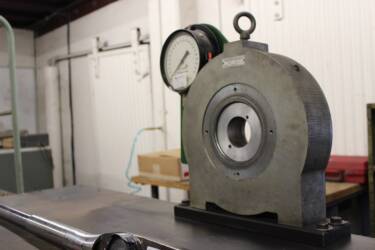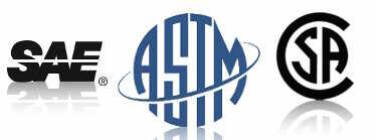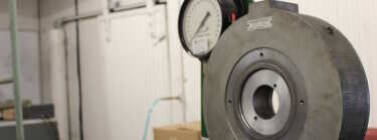Is There a Difference Between ASTM A490 and ASTM A325 Bolts?
The short answer is that F3125 Grade A490 heavy hex structural bolts have higher strength requirements than A325 heavy hex structural bolts. A325 bolts have a minimum tensile strength of 120ksi while A490 bolts have a tensile strength range of 150-173ksi.
In addition, there are a few other differences shown below.
Coatings
A325 structural bolts can be hot-dip galvanized and are commonly found with that coating. A325 galvanized bolts are popular due to their corrosion-resistant properties.
While A490 structural bolts are stronger, due to this strength they are unable to be hot-dip galvanized. Due to the high tensile strength of A490 bolts, they run the risk of hydrogen embrittlement by being galvanized. This could cause the bolts to fail prematurely and possibly become structurally unsound.
Configuration

The ASTM F3125 specification that both A325 and A490 bolts fall under is designated for structural bolts. Typically, structural bolts are heavy hex bolts or tension control bolts typically with short lengths, shorter than average threads, and cannot have a reduced body diameter.
There are some exceptions allowed per the specification. Before 2016, ASTM A325 and ASTM A490 were stand-alone specifications. They have since been reclassified as grades within the F3125 specification. Originally, A325 and A490 bolts had to have a heavy hex head and were not allowed to be in another configuration. Also, the short thread length could not be altered.
However, under the new F3125 specification, any head style is allowed and the thread lengths can be altered. Alterations to the typical A325 and A490 configuration are designated by adding an “S” to the permanent grade marking on the head.
Another difference regarding thread lengths is that A325 bolts are mass-produced in a fully threaded version provided they are four diameters in length or less. This type of bolt is typically referred to as A325T. This fully threaded version of the A325 bolt is not applicable to A490 bolts.
Testing
A325 galvanized bolts that are being purchased with a nut and hardened washer are required to be rotational capacity tested. A rotational capacity test ensures the bolt assembly is capable of developing the proper clamping force. To pass the test, the assembly must reach a minimum amount of rotations and achieve the required tension before failure which depends on the diameter and length of the galvanized A325 bolt. Since A490 bolts cannot be galvanized, this test is not applicable.
All A490 bolts are required to pass a magnetic particle test. This test is used to ensure there are no subsurface flaws or cracks in the steel of the A490 bolt. This test is not required for A325 bolts

Similarities
Besides the differences listed above, A325 bolts and A490 bolts are used for the same applications. They are both used in structural steel connections. They both will have Unified National Coarse threads unless otherwise specified. They both have a diameter range from ½” to 1 ½”, however, it is uncommon to find an A490 bolt smaller than 5/8” diameter.
Both A490 and A325 bolt grades are also made from quenched and tempered medium carbon or alloy steel. Both A490 and A325 structural bolts are available in types 1 and 3. Type 1 is the “regular” chemistry, while Type 3 bolts possess weathering characteristics.
Availability
Both A325 and A490 bolts are mass-produced and readily available in the marketplace. A325 bolts can be easily found in diameters ranging from ½” through 1-1/4” diameter and in length up to about 6” or 8”. A490 bolts are readily available in diameter ranges from 5/8” through 1-1/4” in similar lengths. These are some of the most commonly used bolts in the construction industry.
Manufacturing
Portland Bolt provides or manufactures A325 and A490 heavy hex structural bolts in any diameter and length required for the project. We typically produce these structural bolts when they are larger in diameter or longer in length than mass-produced sizes.
We also manufacture these structural bolts when they require extended thread lengths. On the rare occasion when a head style other than heavy hex is required, those would also be manufactured in our 140,000-square-foot manufacturing and galvanizing facility.
When Portland Bolt manufactures a structural bolt, the first step is to cut the 20’ round bars of medium carbon or alloy steel round bar to length. One end of the cut-to-length round bar is heated and a heavy hex head is forged on the end.
The bolts then undergo a heat-treating process that develops the proper mechanical properties of the given grade. Bolts are then tested to ensure specification compliance before being chamfered and threaded. When required, A325 bolts also are galvanized in our in-house hot-dip galvanizing line.
For emergencies, Portland Bolt stocks headed blanks. These are A325 and A490 bolts that are headed, heat-treated, and tested to ensure they meet the requirements of the specification. They are then put in inventory without threads and used when small quantities of custom sizes or short lead times are required.
These headed blanks simply need to be taken from inventory, cut to length, threaded, galvanized when necessary, and shipped in only a couple of days.
Do you require A325 or A490 structural bolts? If so, give us a call, send us an email, or live chat with us and we will be able to help you out.


